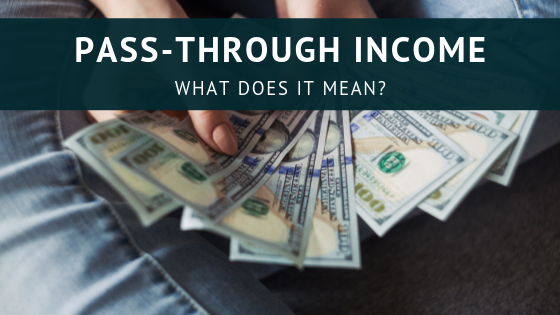If you own a business, it’s a must to understand the tax side of the business. This includes understanding pass-through income.
Maybe you’ve heard of the advantages of registering your business in a no income tax state. In fact, you may have found companies offering to set this up for you for a small fee. However, most nomads and full-time travelers already pick no income tax states for their domicile. How does this impact your business?
Consider this.
Unless your business is a C Corporation (the majority of you should NOT be a C Corp), your business pays ZERO taxes.
Instead, the profits of the business pass-through to your personal return and you pay the taxes yourself. This means where your business is registered makes no difference in the taxes you pay. Instead, it’s where you, as the owner, live and pay taxes that counts.
Let’s briefly look at additional details for the most common forms of business entities: S corporations, partnerships, and sole proprietorships to help understand pass-through income.
S Corporations
Unlike a traditional C corporation, an S corporation is not subject to separate federal income tax. Furthermore, most states also do not subject S corporations to a separate income tax. Instead, each individual shareholder pays income tax on the portion of the corporation’s annual net income received. In other words, in most states, S corporations create pass-through income.
Some states might have a “franchise” or “privilege” tax. It’s important to know the rules of the state in which you register your business.
While an S corporation does not owe income tax itself, it will file a Form 1120S with the IRS. This filing reports the owners and any income passed through to them to the IRS.
Partnerships
There are various types of partnerships, such as general partnerships, limited partnerships (LPs), and limited liability partnerships (LLPs), among others. Regardless of the type of partnership, individual partners will personally owe state and federal income tax on the partnership income distributed to them. The partnership generally does not pay income tax. Keep in mind some states might have a “franchise” or “privilege” tax.
While your partnership might not owe income tax, it will still need to file Form 1065 to report its income and member information to the IRS.
Sole Proprietorships
Income from your business is distributed to you as the sole proprietor and reported on your personal Schedule C as part of your 1040. You will pay federal tax on that income.
As you can see a pass-through business can be an LLC, an S-corp or a simple sole proprietor. Pass-through simply means all the business income passes through to you and gets reported on your own personal return.
Be aware that your business still needs to file a separate tax return if it’s treated as an S-corp or partnership, but it most likely won’t owe any taxes itself. A business or partnership files a return to report income of any owners, members, shareholders or simply put, you.
Keep in mind some states might have a “franchise” or “privilege” tax for S corps and partnerships. Consult with a tax professional to see if your business qualifies for this separate tax.
Does pass-through income make a little more sense now?
Pass-through Income Further Explained
As you can see pass-through income simply means all the business income gets reported on the owners or members personal returns.
Be aware that your business still needs to file a separate tax return if it’s treated as an S corp or partnership, but it most likely won’t owe any taxes itself. A business or partnership files a return to report the income of any owners, members, shareholders or simply put, you.
